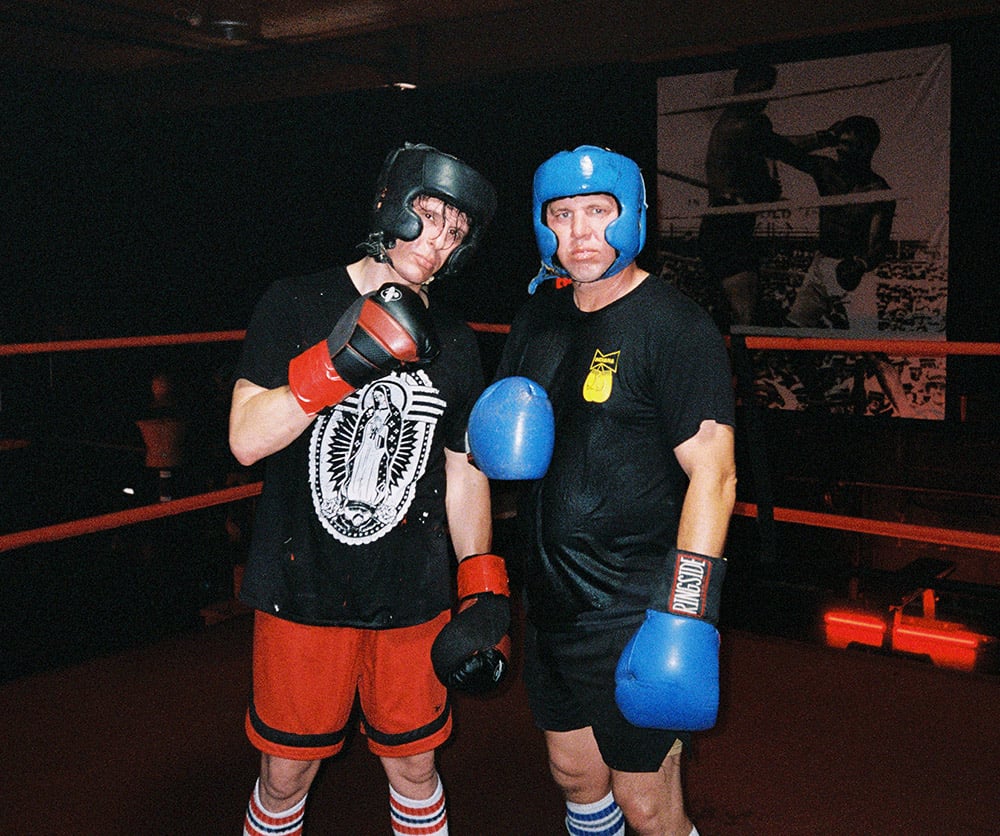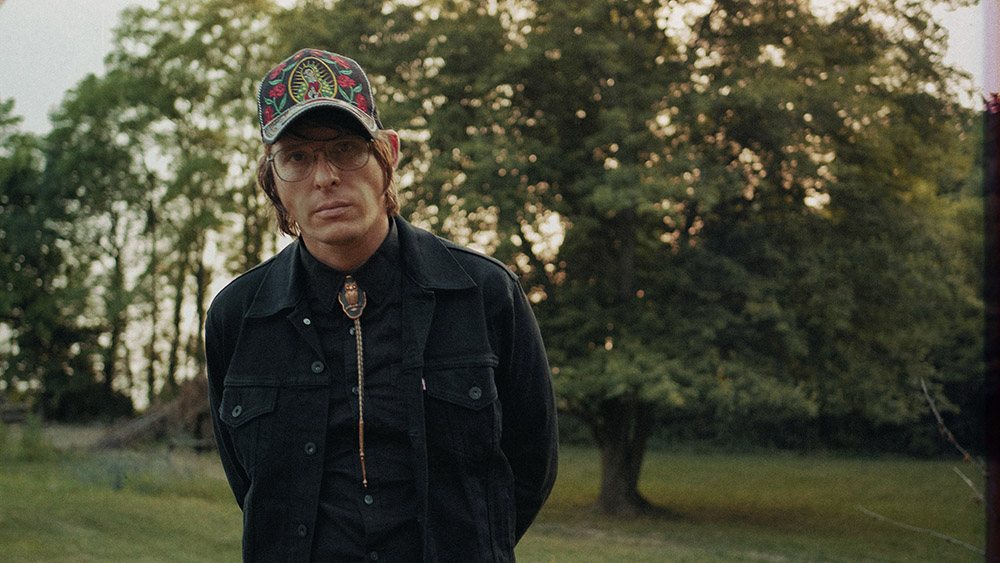
(Photo by Acacia Evans)
STEPHEN WILSON JR.’S INHERITED LOVE OF BOXING HELPED HIM FIND BOTH HIS OWN CALLING AND A DEEPER RELATIONSHIP WITH HIS FATHER
“Write a good song for me.”
Stephen Wilson Jr. was driving as fast as he could. His father, Stephen Sr., was dying, both of them knew it, and 90 miles an hour wasn’t fast enough to get them together one last time, so an iPhone had to do for a goodbye as Junior raced through Kentucky on his way to Indiana.
“I love you.”
“I love you.”
“I love you.”
“I love you.”
Then Stephen Wilson Sr. passed away.
“It was a very unfair resolution to the whole situation,” said Wilson Jr. “There’s also a lot of perhaps some bitterness and some confusion and anger at God about how it all went down. My dad wasn’t supposed to die at 59, and he definitely wasn’t supposed to die like that. It wasn’t supposed to be saying goodbye to him on my fucking iPhone. Everything about it seems so massively unfair, but that’s just life, and me coming to terms with the unfairness and the cruelty of life and trying to marry that with the undeniable beauty of it was my end goal with it, and I really wanted to honor my father’s composure in all of it. Even when he was dying, he was such a G about it. He was so calm. He was still a corner man. He was always so calm in my corners.”
Before he became an acclaimed singer-songwriter whose new album, Son of Dad, is, in many ways, a tribute to his father, Wilson was an amateur boxer, along with his brother, Nicolas. They were trained and cornered by dad, a pretty fair boxer in his own right before he had to give up dreams of pro glory to raise his sons and their sister, Lacie. And through all the ups and downs that come with raising children and rebelling against a parent, Stephen Sr. and Stephen Jr. always had boxing.
“We didn’t necessarily see eye to eye on a lot of things,” said Wilson. “We were really different. He was raised by a Navy man in a Pentecostal environment, really strict and rigid. So I was a little bit naturally rebellious in questioning everything. My dad didn’t really know how to deal with that, someone who could debate him, and him thinking that I was a teenager that thought he knew everything didn’t really make for the best dynamic. But we could sit down and watch a Roy Jones fight, or any fight, and if we were in rocky waters or whatever, it didn’t matter. We just started talking about boxing. It was just an immediate common ground all the way until the day he died. There was a fight on, he’d be like, ‘Hey, you want to watch the fight?’ And whatever we were doing, there’s no way we weren’t watching that fight. So even if it wasn’t even a good one, it was just kind of something to do. And that’s something to always talk about.”
“… we could sit down and watch a Roy Jones fight, or any fight, and if we were in rocky waters or whatever, it didn’t matter. We just started talking about boxing.”
It’s a cliché thing to say, but Stephen Wilson Sr. coulda been a contender. Tough for days and relying on that grit and not much else early on, he made a name for himself on the southern Indiana fight scene in the late ’70s and early ’80s, winning a novice Golden Gloves division title in 1980. He eventually learned the fundamentals under the tutelage of Champ Chaney and was even sent out to Santa Monica in 1982 to work with Muhammad Ali’s amateur boxing team.
“Muhammad Ali was my dad’s dude, not just as a fighter, but as a human being,” said Wilson. “He transcended the sport, and my dad would just go on and on and on about him as a human and a fighter, and that’s how he really got the bug. He watched him fight and he just said, ‘Man, I want to learn how to box. I just have to do it.’ And he became obsessed.”
Then Stephen Jr. came along. Then Nicolas.
“Unexpectedly,” he said. “My dad was being groomed for the pros. He gets recruited onto Muhammad Ali’s boxing team but, at the same time, he has two kids and he’s 20 years old. He has me and my brother. We’re a year and three months apart. Obviously, contraception wasn’t popular where I came from – or good decision-making, for that matter. (laughs) He and my mama both grew up super Nazarene Pentecostal, so it was a shotgun wedding. My mama was almost seven months pregnant with me when they got married. It was one of those things like, ‘You’re going to make this work, kids.’ And they didn’t, but their parents made sure they at least tried.”
It didn’t work. Wilson’s mother had a breakdown while his father was out in California, forcing Stephen Sr. to quit the team and come back to Indiana.

Stephen Jr. and his brother, Nicolas. (Photo by Acacia Evans)
Lacie soon joined the Wilson family. But a third child didn’t calm the turmoil in the house.
“He tried to stabilize the situation, so let’s have another kid. And they did. Yeah, that’ll work. But then by the time they had her, and my sister was about a year old, and my mom [was overwhelmed]. She ran off with [a guy who was an abusive stepdad with substance abuse issues], and she basically just ran away from it all and she lost custody of us. And so my dad ended up getting full-time custody of three kids, which is unheard of, by the way.”
For all intents and purposes, that was the end of Wilson Sr.’s boxing career. He would still compete as an amateur, but after going 18-1 and getting positive notices as a future pro with legit potential, he had more important matters to tend to.
“My dad went from a guy that was beating the shit out of people in the ring to a guy that was curling my little sister’s hair, getting her ready for pictures a couple years later,” Wilson said. “He was like, ‘There’s no way I can go pro and raise these kids. There’s just no way.’ So he worked full-time, like 70 hours a week. He had to work two jobs to raise us, but he said, ‘I’m not going to quit boxing. I love it too much, and I’m going to still stay very actively involved with what little time I have in my life to be the best amateur boxer I can be.’”
His dreams deferred, Wilson Sr. passed his love of the sport down to his sons, and they loved it as much as their dad did. But as he trained the pair, he was determined to give them an entirely different upbringing in the ring than the one he had.
“Boxing was my first fascination. My earliest memory, honestly, is going to watch my dad fight.”
“He could have gone pro and been a name, but life happened,” said Wilson. “And it’s a classic story; you hear it all the time. But he also took a beating. And I think hindsight being 20/20, in his later years, he’s probably glad he didn’t (turn pro), because he didn’t learn the fundamentals that me and Nicholas learned early on. He kind of learned later and took some punishment to get there. So by the time we started boxing, my dad taught me and Nick how to duck before he taught us how to punch. He was like, ‘Your face ain’t going to look like mine; you don’t need five broken noses.’ I remember my dad literally having to peel his eyes open to look at us in the morning from just sparring the night before in Indianapolis.”
When you’re introduced to the non-glamorous side of the sport at the start, it gives you a sense of reality that those with dreams of glory and big paychecks don’t get until it’s often too late. And early on, Stephen Jr., who had his first fight at the age of 7, knew that Nicolas was the better boxer of the two, so his goals were modest as he fought his way through the amateur circuit. All he knew was that he loved to box and everything around it.
“I was raised in it, man,” he said. “Boxing was my first fascination. My earliest memory, honestly, is going to watch my dad fight. Going into boxing gyms and watching everyone train, the smell of cigar smoke and isopropyl alcohol mixed with menthol. Those smells are just part of my childhood.”
Wilson talks about fighting in smokers at the Police Athletic League gyms in the area, and it’s almost like a different world from what you see these days.
“It’s a scene, for sure,” he said. “It was a lot of cops and retired cops gambling under the table. I just remember them screaming my color. (laughs) They didn’t care about your name. You’re red or blue. That’s all they cared about because, most likely, somebody had $20 on blue or $20 on red.”
No matter what color Wilson was wearing, he always showed up not just to win, but to give those in attendance a fight to remember. That was lesson two implemented by dad following the order to duck. And sometimes, the Wilson brothers even fought each other.
“We would actually open up for the adult fights,” he said. “And sometimes, if there wasn’t another kid the same size as me and my brother, we would fight each other as an exhibition. And honestly, those were better brawls because a lot of people didn’t really correlate that we were brothers. They didn’t even care. Like I said, it was red or blue. So we would go up there and just beat the shit out of each other. We were so used to doing it; we were like Irish twins. (laughs) We’re only a year and four months apart, so we were perfect-sized sparring partners. And we would just tear it up. So I tell people my first stage wasn’t a stage at all. It was a boxing ring, and that’s kind of where I learned to perform. I remember my dad even saying, ‘I’m going to go put on a show for these people.’ And I’d hear other fighters say that, too. You’re not going to go out there and just fight. It’s like, no, this is entertainment in a craziest way. So I remember just seeing my dad work a crowd and seeing the other fighters work crowds, and that whole aspect of the sport was a thing. It wasn’t about just punching somebody.”

(Photo by Acacia Evans)
That desire and willingness to perform for the paying folks stayed ingrained in him when he ultimately made music his day job, and that future vocation may have been written in the stars as soon as he got his first guitar.
“I always loved music,” Wilson said. “My brother had a real natural affinity for boxing; I just had an obsession with it. I had to work a lot harder to get as good as he was, which was really good. It actually created a work ethic within me that was really strong. It showed me how to reach goals that seemed unattainable. I saw my brother do it, and I was like, ‘How is he doing that? I can’t do it.’ But suddenly I’m doing it; it just took me longer. But with music, it was the flip. For some reason, music, I just knew how to do it. My dad got me a guitar and I just knew how to play it. I took a lesson to learn how to read tablature, and I was off to the races quickly. My brother, it took him a month to figure out how to play a G chord, and I was playing Led Zeppelin in a couple weeks after picking up the damn thing. When I got into music, I quickly identified it as, ‘Oh, that’s what Nick has with boxing.’ That’s what music is to me. So Nick would have to work 10 times harder to do what I could do in minutes. So it was easy for me to recognize that boxing was my brother’s.”
And music belonged to Stephen. Before then, though, there would be a trip to the Golden Gloves finals that fittingly brought everything full circle for him and his dad as far as boxing was concerned.
“I grew up watching my dad there, so it was a huge bucket list moment for me,” said Wilson. “But okay, what happens after this? You’ve achieved this massive goal of yours, I was doing really well at school, and I felt like, for whatever reason, that I was going to stay engaged in the sport of boxing.”
There was a scholarship offer from the Golden Gloves for $1,200, but that wasn’t enough to entice him to train and keep up with his studies.
“I was going to a school that was three hours away from my hometown and my gym,” Wilson recalls. “And just logistically speaking, it was very difficult to make it work with the workload I had. I was on an accelerated graduation program, and I was just a super-eager kid wanting to get to work and fight his way out of poverty. I grew up real poor and I was the first kid in my family to go to college or even be smart enough to go to college.”
The whole college thing shocked Stephen Sr., so much so that when the time came for Junior to hit the road to academia, he couldn’t believe it.
“The night I left to go to college, I woke him up because he’d always go to bed really early.”
“Hey Dad, I’m leaving.”
“Where are you going?”
“I’m going to college, Dad; I’ve been telling you for weeks now.”
“Really?”
Senior got up, grabbed his wallet and gave Junior everything he had in there. A 20-dollar bill.
“Call me when you get there.”
“He still didn’t really believe it,” Junior laughs. “He’s like, ‘I’m going to need proof when you get there. You better send me a picture or something.’ He didn’t believe it because college is for rich kids and you’re not a rich kid. And that was just what was ingrained in his brain.”
Wilson would graduate from Middle Tennessee State University with a degree in microbiology that he used as an R&D scientist. But music never left his soul, and as proud as his father was about his son’s accomplishments, he knew where Stephen Jr. needed to go.
“When I quit my job as a scientist to be a songwriter, my dad was like, ‘You have to quit that job. You do it, you do it now and you go fight like you’ve never fought before, because I think you’ll win.’ And I was just trying to be a songwriter. I was just trying to get cuts on other people’s records. The dream of me ever singing in front of people was not on the table. My dad always saw more potential in me than I did, literally from the beginning, He was always speaking things into my life that I never would believe. He’d be like, ‘Why don’t you go up there and sing? I’d say, ‘Dad, I don’t do that. I don’t sing the songs; I write the songs. Someone else sings them.’”
That would change on September 15, 2018.
Life wasn’t easy for Stephen Wilson Sr. over the years, but he was doing all right. His kids were good, he was a respected member of the community and owned his own auto body shop, Wilson Auto Body, which he ran with Nicolas. He was also a pretty fair softball player. But then he got sick.
“He got diagnosed with this thing called pulmonary fibrosis, and it was doing a number on his lungs, but he was taking medicine and stuff for it,” said Wilson. “But he ended up developing an embolism because of that condition. And so really what killed him was an embolism in his lungs. Basically, his lungs were shutting down and there was nothing they could do about it. So he was literally on his last breath. But as much as his body was shutting down, when he was on the phone with me, it was like he was just so cool about it. It didn’t make any sense to me. My brother and sister were there with him. My sister is holding the phone and she’s obviously hysterical, and even when he died, he died composed, telling me it’s going to be okay. He’s the one dying and he’s telling me it’s going to be okay.”

(Photo by Tim Cofield)
Sadly, it wasn’t okay for Stephen Wilson Sr.’s son, who had a festival to play in Deadwood, South Dakota, a couple weeks after his father’s passing. He canceled it, but then a chat with the festival’s promoter changed his mind.
“He was like, ‘Hey dude, this is the Black Hills of South Dakota. I think you need to be here, and I think this is going to help you. I don’t know why, but you should come to the Black Hills.’ And I was like, ‘Okay, why not? I have nothing to lose.’ I just wanted to die. I wanted to just be with him. I wanted to kill myself just so I could hang out with my dad. That’s how sad I was.”
Wilson played a few songs, then came the traditional end of the festival where each artist played a cover song. Wilson chose the Bill Withers classic “Stand by Me,” but it came with his own twist on it.
“That song has haunted me since birth,” Wilson said. “I don’t know why. I love the song so much, but it also scares the shit out of me for some reason. So I go up there, and I’ve been playing ‘Stand by Me’ in my living room for years, but nobody ever hears it really. And I do this darker version of it. It’s actually a little bit more folksy sounding and darker and more like a Joni Mitchell or Tom Waits approach to the song. There was like 5,000 people there, and I’ve never really sang songs in front of people. I’ve mainly just been a behind-the-scenes songwriter, and I played and it turned into a revival. It was unlike anything I’ve ever seen. Still, to this day, it freaks me out because my dad grew up in church, and he was very religious. It was almost like he created a revival in that venue in the Black Hills. And it felt like he was a four-year-old child sitting on my shoulder in the weirdest way possible. It was this weird reversal of roles where suddenly he was a kid again. He died and the purity of his spirit was on my shoulders in that moment while I was playing that song. It was like that moment right there was the moment I became an artist; the moment he died is when the whole process started.”
On September 15, 2023, five years to the day from his father’s passing, Wilson released his Son of Dad album. He didn’t just write one good song for Senior, he wrote 22 of them, and critics and fans seem to agree, with the album showing up on a growing number of “Best of 2023” lists. The cornerstone, of course, is “Father’s Son,” a tribute not just to his dad, but all dads.
I wear his blue jean jacket
And his name like a badge of honor
I used to hate being called Junior
But I don’t mind any longer
I’ve never known better, yeah
‘Cause every bone’s tethered
You wanna change my name
Gotta drain my blood
Everything I am’s everything he was
God damn, I am my father’s son
I am my father’s son
“That’s a weight that I carry with me,” he said. “There’s a legacy, but there’s also an urgency to it. So that’s the best way I can really put it. I’m carrying him around with me but at the same time figuring out a way to let him go. So this record is like a statement that I have to move on, the fight has to continue, but I want to acknowledge what we went through together without getting too specific. I wanted to relate to everybody. Everybody’s had a father, whether they knew him or not, and everybody’s had a mother. I’ve had so many daughters come up to me and talk about how it’s affected them with their fathers and their mothers and their sons and their mothers. It’s like the story goes both ways.”
That’s the mark of a great songwriter, and Wilson is one of the best in the business these days. And while he hung up the gloves a long time ago, he still trains at the Music City Boxing Gym in Nashville. I ask him if he’s still got something left in the basement.
“Oh, hell yeah,” he laughs. “There is definitely something in the basement. I am a touring musician, so I have to protect my hands and my body. But man, all I think about is fighting again. Honestly. It’s in me, man. I want to protect this career that I’m building, but, at the same time, it’s not something that goes away, and I don’t think people understand that. It was something that was born into me. I know I’m not going to be a champion. But once you step into that ring, it never leaves you.”

Watch the “Father’s Son” music video on YouTube

